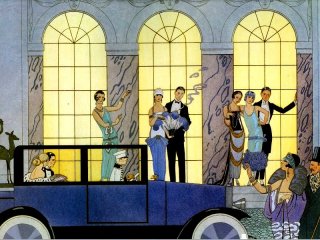Jazz Age Culture
Part III

Nichols Home Page // Jazz Age Part I // Jazz Age Part II

Winold Reiss, "Interpretation
of Harlem Jazz"
(c. 1915-20)
"We younger Negro artists who create now intend to express our individual
dark-skinned selves without fear or shame. If white people are pleased we are glad. If they are
not, it doesn't matter. We know we are beautiful. And ugly too. . . . If colored people are pleased we are glad. If they are not, their displeasure
doesn't matter either. We build our temples for tomorrow, strong as we know how, and we stand
on top of
the mountain, free within ourselves." (from Langston Hughes,
"The
Negro Artist and the Racial Mountain")
"It was the period when the Negro was in vogue. I was there. I had a swell time while it lasted. But I thought it wouldn't last long." (from The Big Sea by Langston Hughes, 1940)
Hughes: Texts
Scholarly Articles on Hughes' Poetry

Dust Jacket Illustration
by John Held, Jr. (1922)
"Ernest Hemingway, echoing
Gertrude Stein, labeled the generation
'lost,' and catalogued the deaths of many of
its illusions, chief among them, perhaps, the
death of romantic love." (from
Bryant Mangum,
course description for "Early American Twentieth Century Literature")
"Here was a new generation . . . dedicated more than the last to the fear of poverty and the worship of success; grown up to find all Gods dead, all wars fought, all faiths in man shaken. . . ." (from F. Scott Fitzgerald, This Side of Paradise, 1920)
"That's the whole burden of this novel [The Great Gatsby]--the loss of those illusions that give such color to the world so that you don't care whether things are true or false as long as they partake of the magical glory." (from F. Scott Fitzgerald letter, 1924)
Great Gatsby: Study Aids & Student Papers
Great Gatsby: Professional Reviews/Scholarly Articles
Hemingway's Sun Also Rises
Stein: Commentary and Scholarly Articles
Stein and Picasso

"Whoa! Nellie! Stop Rag" by
George Gould and Charles N.
Daniels
(sheet music, 1915).
"On or about 1910, just as
the automobile and airplane were beginning to
accelerate the pace of human life, and
Einstein's ideas were transforming our
perception of the universe, there was an
explosion of innovation and creative energy
that shook every field of artistic endeavor.
. . . It was an era when major artists were
fundamentally questioning and reinventing
their art forms: Matisse and Picasso in
painting, James Joyce and Gertrude Stein in
literature, Isadora Duncan in dance, Igor
Stravinsky in music, and Frank Lloyd Wright
in architecture."
(from The Academy of American Poets,
The Modernist Revolution: Make It New,
2003)
"The perpetual task of poetry is to 'make all things new.' Not necessarily to make new things. . . . It is always partly a revolution, or a reaction, from the work of the previous generation." (from T. S. Eliot, "Tradition and the Practice of Poetry")
Scholarly Articles about H.D.:

Go to Jazz Age Part I or Jazz Age Part II
Return to Nichols Home Page
Image, top of page: "Farewell" (1920) by Georges Barbier

Named Best of the Web for F. Scott Fitzgerald by Shmoop